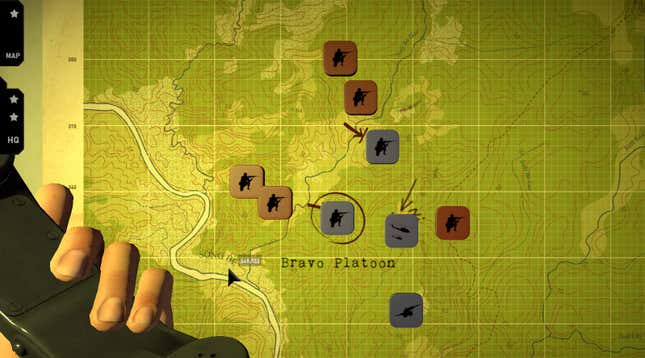
The entire point of strategy games, and a lot of the appeal, is that you’re given direct control over entire units or even armies, even if historically you’d have only a fraction of that influence. Radio Commander realises that, and it’s a fascinating game because of it.
It puts you in the position of an officer who is back in relative safety in a US firebase, but who is also at the same time in command of platoons who are out there in the field getting shot at.
You have missions to complete, and a map, and a radio. And that’s it. You do everything with that incredibly limited toolbox, and the majority of your time spent with Radio Commander is either issuing radio commands or listening to the replies and updates coming in from your troops.
While this initially sounds fine, calling to mind our experience with more contemporary wars like Iraq and Afghanistan, with their drone footage and helmet cameras, the fact this game is set in the 1960s throws that out the window.
In Radio Commander you see nothing, and are never in direct control of your men. All you can do is issue general commands, like move to a certain point of the map and engage, and then sit back tensely, praying that everything turns out OK.
The map you’re given doesn’t even update. You need to do that manually, radioing in for location updates then moving unit markers onto that grid position accordingly.
While this would make for a pretty drab experience in a more open-ended strategy game, Radio Commander is a scripted, narrative campaign that in addition to giving you tactical decisions to make also has you confronting the moral quagmire of the Vietnam war, from civilian abuse to CIA operations.
As you get wrapped up in the story, the outcome of missions becomes incredibly tense. I can’t remember a simple “move” order in a strategy game ever being so heart-wrenching, as you sit idly by for minutes at a time (you can speed things up with a timelapse clock, though), waiting to hear back from units, or order a platoon into combat only to be met with silence.
Sometimes these limitations go from being “interesting” to “frustrating”, especially when things are going terribly and you have no idea just how terribly they’re going to get, or the tedium of constantly radioing in for a unit’s position gets tiring, but it’s hard to argue for greater direct control of units when that frustration is half the point of putting the player in this position in the first place.
This won’t be for everyone, but if like me you’re interested in strategy games that are trying to explore genuinely new avenues of command and control, it’s definitely worth looking into.